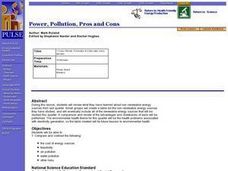Curated OER
Mini-Sanitary Landfill
Second graders work in groups to bury a variety of trash items and arrange them in a mini-landfill. They predict which items will biodegrade and then keep records of what the items look like every ten days. Students consider how...
Curated OER
Making Paper
Students create paper by adding a few small scraps of paper into the blender pitcher and adding just enough water to thoroughly soak paper.
Curated OER
Using Our Natural Resources Wisely
Middle schoolers understand how ground water can be recycled to maximize its usage and begin to think about ways conservation can help Kansas preserve its natural resources in other areas - soil, minerals, and clean air.
Curated OER
Fireplace Logs from Newspapers
Students discuss the topic of recycling. They identify items that can and cannot be recycled. They practice using their newspaper to make other items.
Curated OER
Power, Pollution, Pros and Cons
Learners review what they know about non-renewable energy, compare and contrast advantages and drawbacks of each type, such as cost of energy sources, feasibility, air pollution, water pollution, and other risks, and create table listing...
Curated OER
Solid Waste Management
Sixth graders examine the role of packaging of everyday products and urge manufacturers to reduce the amount of it. They also discover how many products they use everyday can be recycled.
Curated OER
Cycling of Matter and Energy
These twenty various types of questions related to the cycling of matter and energy require students to match each definition in column 1 with the correct vocabulary term from column 2. Then, students explain what is being demonstrated...
American Farm Bureau Foundation for Agriculture
My Miniature Greenhouse!
Here is an activity that will peak your super scientists' interest and knowledge of greenhouse gardening. Green thumbs flourish when they build, prepare, take care of, and observe their seedlings inside a miniature greenhouse. With...
Curated OER
Plastic Identification Lab
In this plastics worksheet, learners experiment with an unknown plastic and determine the polymer name and resin code by using a flow chart of various tests. They answer five questions after they collect their data.
Curated OER
Ecosystem Interactions in Refuges
Seventh graders, using national parks as models, illustrate the energy flow in ecosystems. Working in groups, they use murals, flow charts, or other visual displays to record their findings. Students represent the food chains and webs...
Curated OER
Halloween Literature Unit: Pumpkin Patch Unit Project
Students simulate an agriculture project. In this sequencing lesson, students observe their classroom pumpkin patch, make journal entries, and predict how the pumpkins will grow. They discuss as a class how to keep their pumpkins safe...
Curated OER
African Drumming - Repetition of Patterns
Students are introduced to basic patterns used in African drumming. They listen to examples of drumming by Kundidzora Azim, participate in chants and repeat demonstrated rhythms as a class.
Curated OER
Local Environmental Issues: Pollution
Third graders discuss the ways in which human interaction with the environment and production of waste products contribute to pollution. Through a pollution demonstration, they explain how various groups of plants and animals can be...














